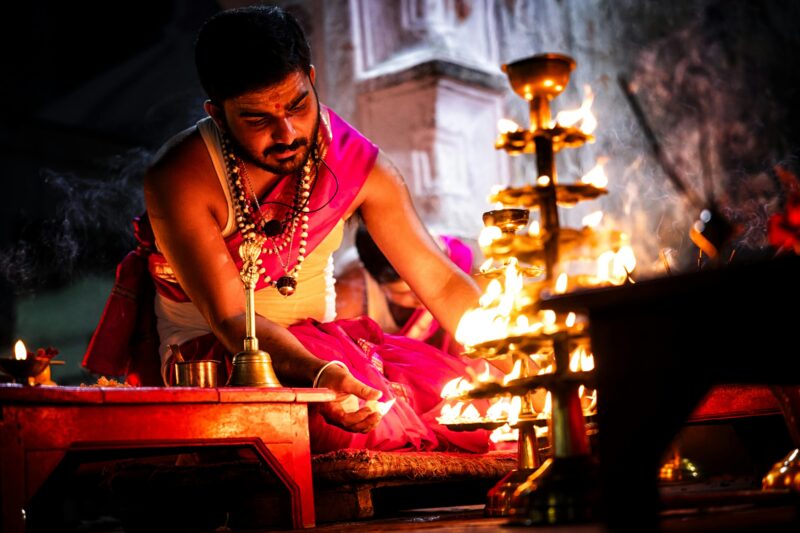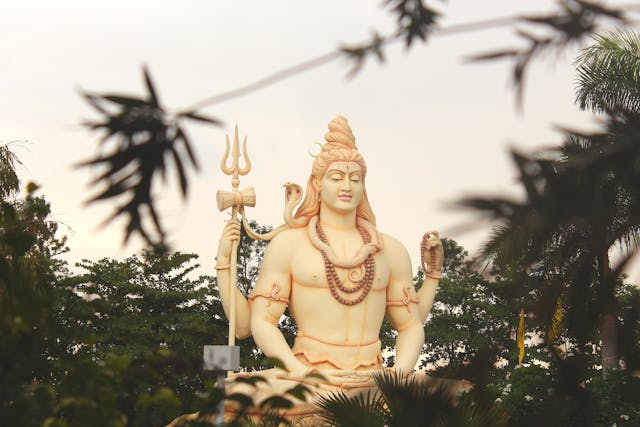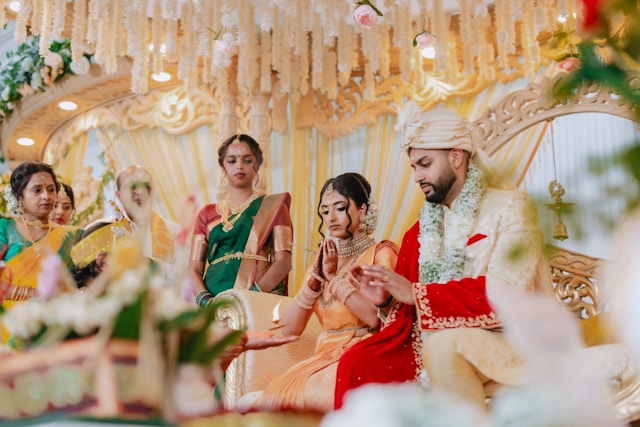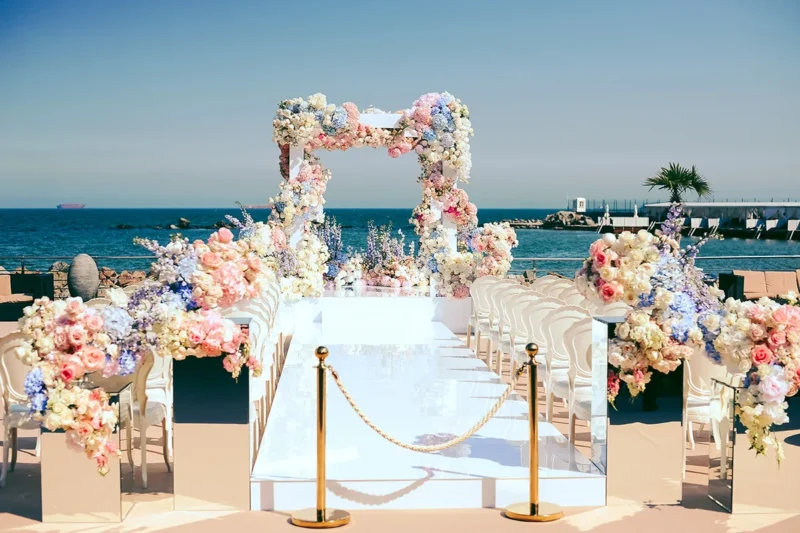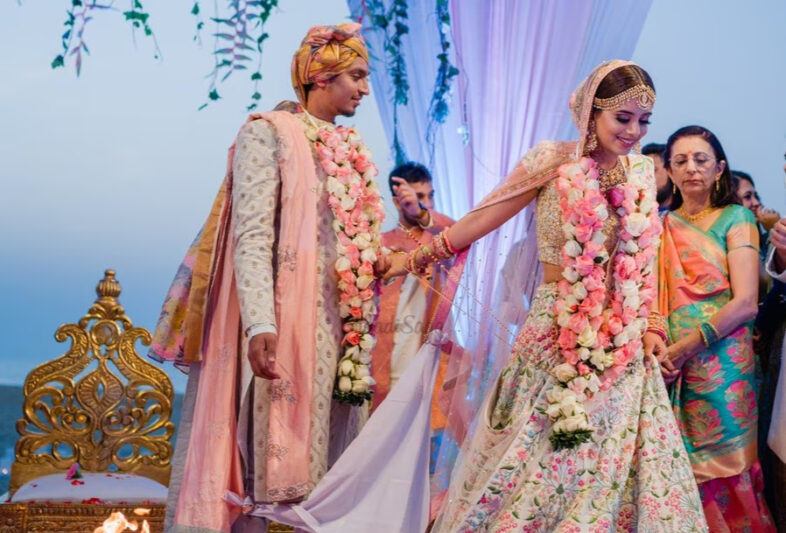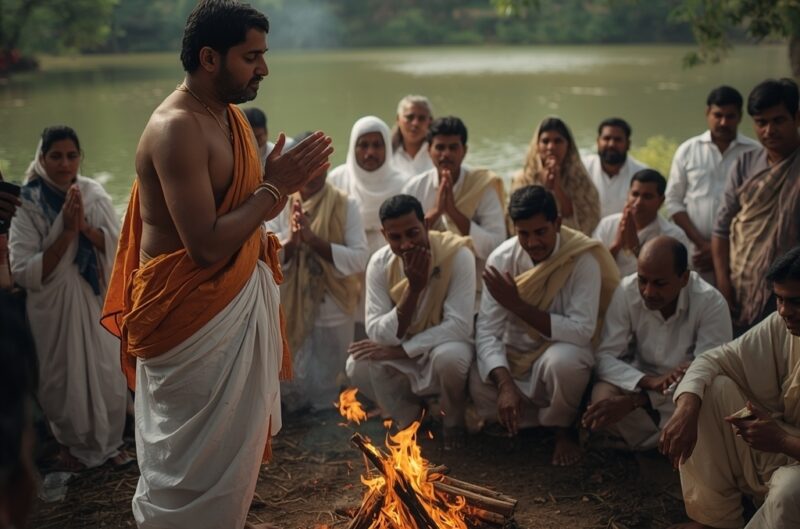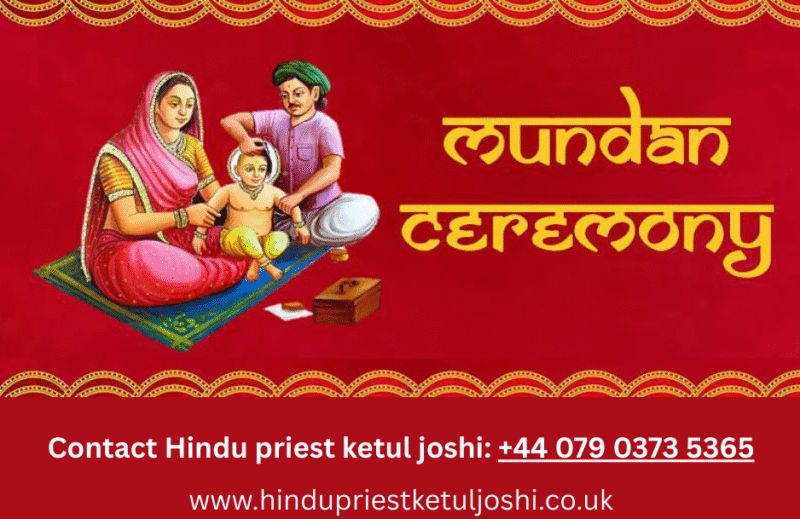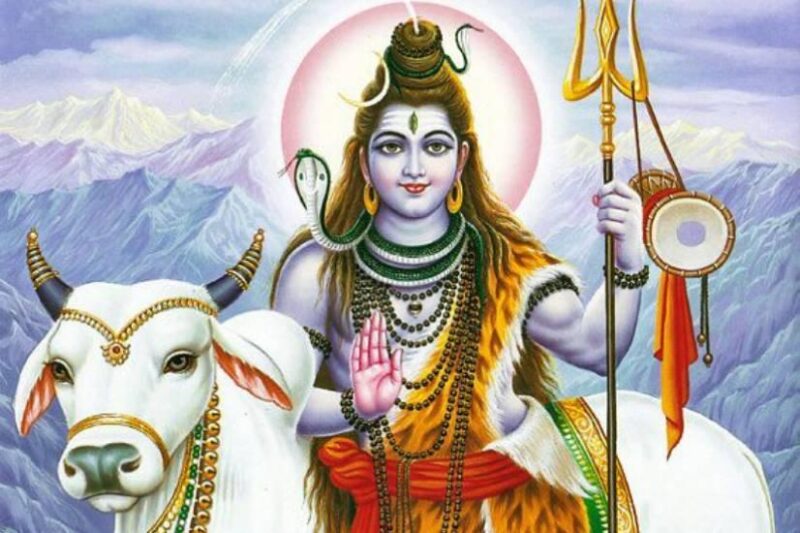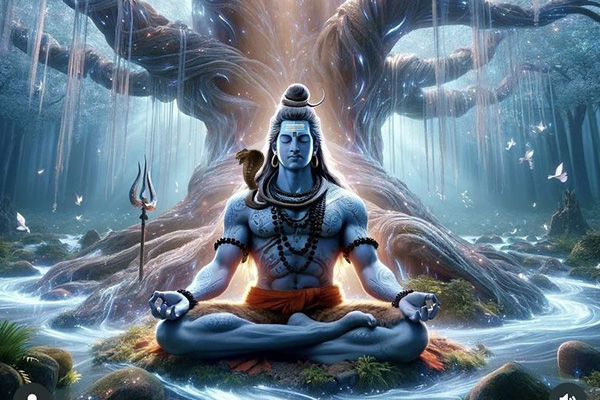Hinduism wedding Rituals step by step

Hinduism wedding Rituals step by step
A Hindu wedding, also known as Vivaah, is a sacred and elaborate ceremony that involves various rituals and traditions. Hindu weddings are deeply rooted in cultural and religious practices, and they vary in detail based on regional and community differences. Here is a general overview of the common elements found in Hinduism wedding Rituals step by step:
1) Pre-wedding Rituals in Hinduism Wedding rituals step by step:

1) Mangni/Sagai (Engagement) in Hinduism wedding Rituals step by step:
The formal engagement ceremony is where the families exchange gifts and the couple exchanges rings.
a. Tilak Ceremony:
In some communities, the groom is blessed by the elders of the bride’s family, and a tilak (a mark made with vermillion or sandalwood paste) is applied on his forehead. This signifies the formal acceptance of the groom into the bride’s family.
b. Gift Exchange:
The families exchange gifts as a token of goodwill and acceptance. Traditional gifts may include clothes, jewelry, sweets, or other items.
c. Blessings and Speeches:
Elders from both families offer blessings to the couple, expressing their joy and support for the upcoming union. It’s common for family members to share speeches or express their happiness on this occasion.
2) Mehendi:
The bride’s hands and feet are decorated with intricate henna designs.
3) Haldi Ceremony:
Both the bride and groom are applied with turmeric paste by their respective families to cleanse and purify them before the wedding.
4) Sangeet Ceremony:
A musical night filled with dance and music, where family and friends celebrate through performances.
5) Baraat and Arrival:
The groom, accompanied by his family and friends (baraatis), arrives at the wedding venue in a procession. The bride’s family welcomes them.
2) Wedding Rituals – Hinduism wedding Rituals step by step:
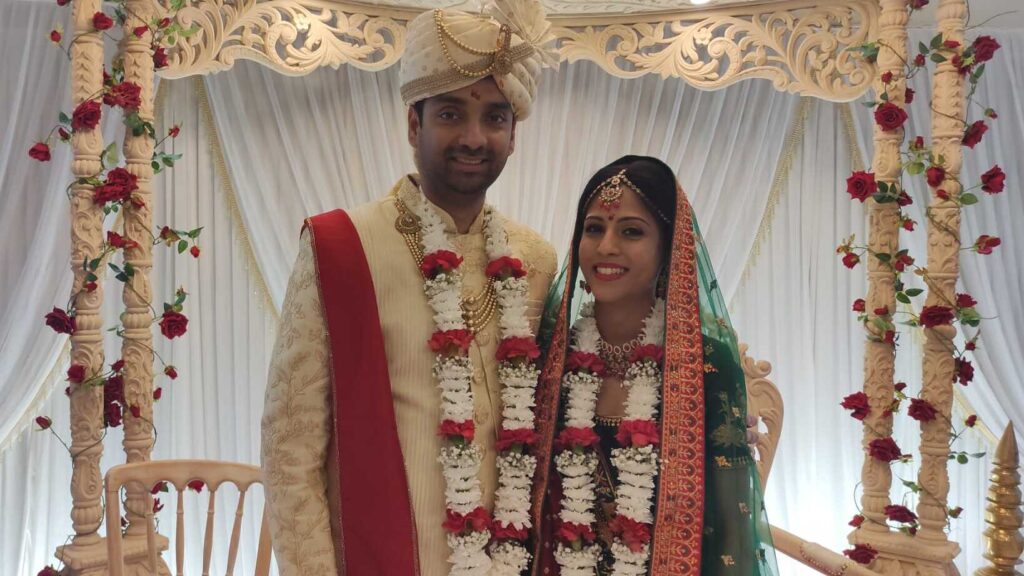
1) a. Ganesh Puja:
The wedding festivities often begin with a prayer to Lord Ganesha, the removal of obstacles, and seeking his blessings for a successful and smooth ceremony.
b. Mehendi Ceremony:
The bride’s hands and feet are adorned with intricate henna designs in a festive gathering.
2) Jai Mala:
The bride and groom exchange floral garlands as a symbol of acceptance of each other guided by a Hindu wedding priest/ Hindu priest in London.
3) Kanyadaan:
The Kanyadaan is bride’s father gives her away to the groom, symbolizing the trust and responsibility entrusted to the groom led by a Hindu priest/priest for a wedding.
4) Mangal Sutra and Sindoor:
The groom ties a sacred thread, the Mangal Sutra, around the bride’s neck, symbolizing the marital bond. He also applies sindoor (vermilion) on her forehead.
5) Mangalsutra and Sindoor Ceremony:
a. The groom places the mangalsutra (sacred necklace) around the bride’s neck, symbolizing marital commitment.
b. The groom applies Sindoor (vermilion) on the bride’s hair parting, symbolizing her marital status.
6) Saptapadi:
The couple takes seven symbolic steps (Saptapadi) around the sacred fire, each step representing a vow for a harmonious life together.
7) Ashirvad/Blessings:
The elders of both families bless the newlyweds for a happy and prosperous married life.
8) Ashirvada (Blessings):
The couple seeks blessings from elders and receives their good wishes for a happy married life.
Post-wedding rituals in a Hindu wedding vary based on regional and cultural differences, but some common practices are often followed. These rituals typically take place after the main wedding ceremony and may extend for a few days. Here are some post-wedding rituals commonly observed in Hindu weddings:
9) Vidaai (Farewell):
This emotional ritual involves the bride bidding farewell to her parental home. She throws back handfuls of rice over her head, symbolizing gratitude and prosperity.
3) Role of Hindu Priest London in Hindu wedding ceremony- Hinduism wedding Rituals step by step
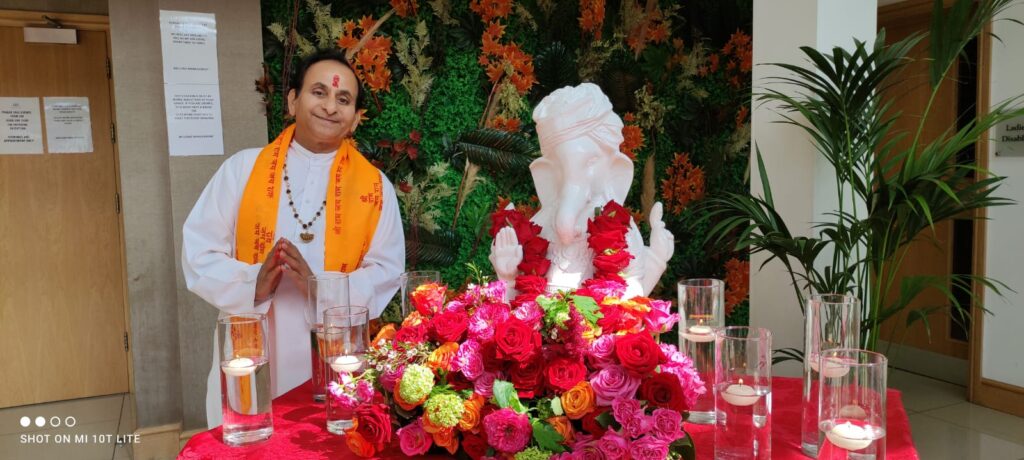
In Hindu weddings, the role of the Wedding priest, often referred to as the “priest for a wedding” or “purohit,/wedding priest” is crucial. The wedding priest is responsible for conducting the religious ceremonies and guiding the couple and their families through the various rituals. The Hindu wedding priest plays several important roles throughout the wedding ceremony:
1) Setting the Auspicious Time (Muhurat)by Indian priest:
The wedding priest helps in determining an auspicious date and time for the wedding ceremony based on the Hindu calendar and astrology. This is known as the Muhurat.
2) Vedic Chants and Mantras by Wedding Priest:
The wedding priest for a wedding recites Vedic chants and mantras from sacred scriptures during the wedding rituals. These chants are considered sacred and are believed to invoke divine blessings.
3) Performing Sacred Rituals:
The wedding priest in London is responsible for conducting the main wedding ceremony and the associated wedding rituals. This includes the exchange of garlands (Jai Mala), the seven steps around the sacred fire (Saptapadi), and other customs like Mangal Sutra and Sindoor ceremonies.
4) Explaining Ritual Significance:
The Hindu priest explains the significance and meaning behind each ritual to the couple and their families. This helps in fostering a deeper understanding of the cultural and spiritual aspects of the wedding.
5) Ensuring Ritual Purity:
The wedding priest ensures that the rituals are performed with the utmost purity and adherence to tradition. This includes guiding the couple and participants on the correct procedures and sequences.
6) Offering Guidance to the Couple:
The priest for a wedding provides spiritual guidance to the couple, emphasizing the importance of their commitment and responsibilities in married life. They may also offer advice on leading a harmonious and virtuous life together.
7) Conducting Pre-wedding and Post-wedding Rituals:
Apart from the main wedding ceremony, the wedding priest may also conduct pre-wedding rituals like Haldi, Mehendi, and Sangeet, as well as post-wedding rituals like Vidaai and Grihapravesh.
8) Blessing the Couple:
Towards the end of the ceremony, the wedding priest often bestows blessings upon the newlyweds, wishing them a prosperous and happy married life.
9) Performing Special Pujas:
The Hindu priest may conduct specific pujas (religious rituals) to invoke the blessings of deities for the well-being of the couple and their families.
The role of the Hindu wedding priest is not only to officiate the wedding but also to create a sacred and spiritual atmosphere. Their guidance is considered essential for the proper conduct of the rituals and for ensuring the sanctity of the marriage ceremony following Hindu traditions.
4) Post-Hindu wedding rituals – Hinduism wedding Rituals step-by-step
1) Griha Pravesh:
The bride is traditionally welcomed into the groom’s house for the first time. This ceremony symbolizes her entry into her new home and the start of her life with the groom.
2) Satyanarayan Puja:
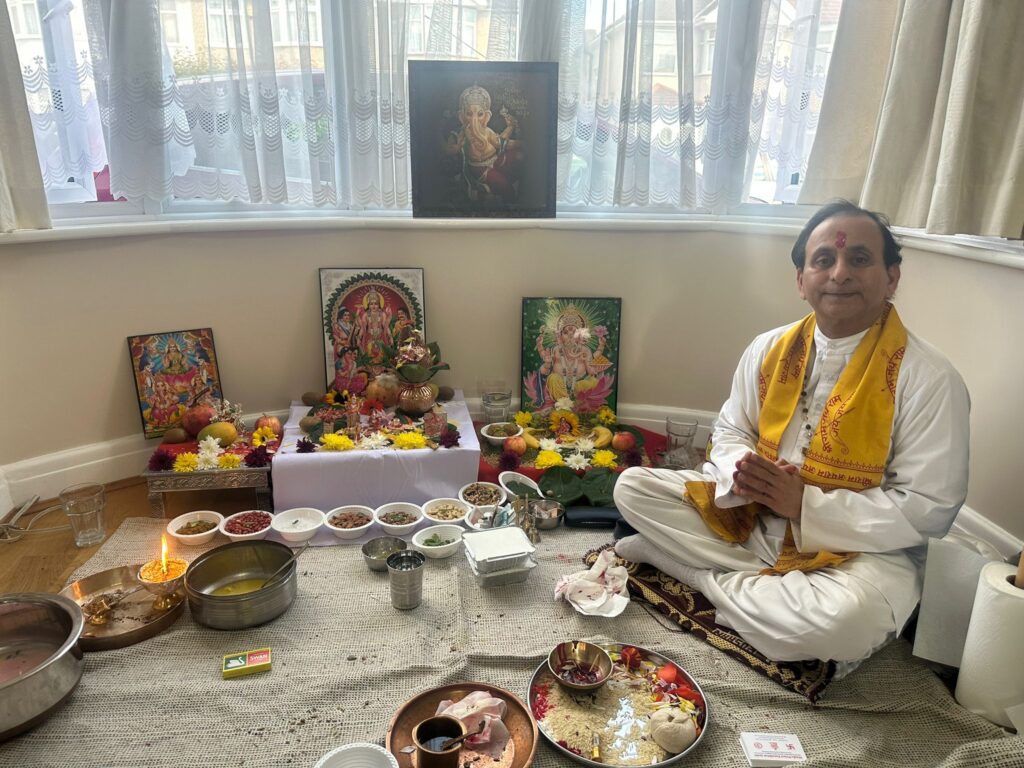
A Satyanarayan katha puja ceremony is performed by the newlyweds and their families to seek blessings from Lord Vishnu for a happy and prosperous married life.
3) Mooh Dikhai (Showing the Face):
The bride, after reaching her new home, unveils her face to the in-laws and receives gifts and blessings.
4) Pag Phera:
The bride returns to her parental home a few days after the wedding to visit her family. This ritual reinforces the bond between the bride and her birth family.
5) Chauthi (Fourth Day) and Chouthi (Sixth Day):
Various customs and rituals are performed on the fourth and sixth days after the wedding. These may include religious ceremonies, family gatherings, and celebrations.
6) Saubhagya Vati Bhava (Wishing for a Fortunate Life):
This ceremony is conducted to wish the bride a happy and prosperous life ahead. Married women from the groom’s family present gifts to the bride.
7) Aashirwad (Blessings):
The couple seeks blessings from elders, including family members and friends, for a blissful married life.
8) Game of Ring Retrieval:
A playful post-wedding game where the newlyweds compete to retrieve a ring from a pot of milk or water. It is believed that the one who retrieves the ring first will have the upper hand in the marriage.
9) Griha Pravesh:
A Grih pravesh ritual where the couple enters their new home together, marking the official beginning of their life as a married couple.
It’s important to note that the specific post-wedding rituals can vary, and not all families may observe every tradition. The customs mentioned above provide a general idea of the typical post-wedding ceremonies in Hindu culture.
10) Reception:
A celebratory event where family and friends come together to congratulate the couple and partake in the joyous occasion.
It’s important to note that the specific rituals and traditions can vary across different Hindu communities, regions, and families. Additionally, modern Hindu weddings may incorporate elements from different cultures and have a blend of traditional and contemporary practices.
